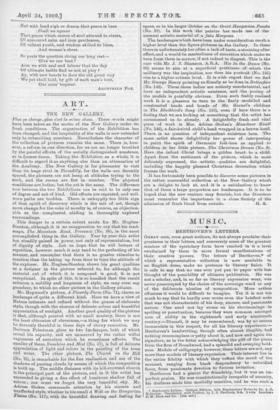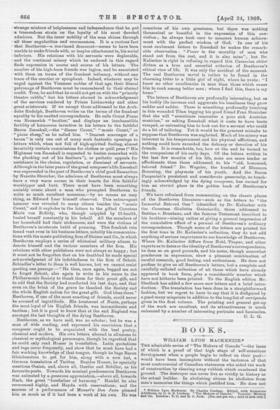MUSIC.
BEETHOVEN'S LETTERS.
GREAT men, even great authors, do not always proclaim their greatness in their letters, and conversely some of the greatest masters of the epistolary form have reached in it a level unattained by them in more formal manifestations of their creative powers. The letters of Beethoven,* of which a representative collection is now available in an English dress, make no pretence to literary finish. It is safe to say that no one ever put pen to paper with less thought of the possibility of ultimate publication. He was not a scholar, and, in so far as literary expression went, was never preoccupied by the choice of the sovereign word or any of the deliberate niceties of composition. More artless effusions it would be difficult to imagine. Yet it is not too much to say that he hardly ever wrote even the briefest note that was not characteristic of his deep, sincere, and passionate nature. One need not lay stress on his shortcomings in spelling or punctuation, because they were common amongst men of ability in the eighteenth and early nineteenth centuiy.—Disraeli, it may be remembered, was by no means immaculate in this respect, for all his literary experience.— Beethoven's handwriting, though often almost illegible, had nothing commonplace or petty about it, and now and again his signature, as in the letter acknowledging the gift of the piano from the firm of Broadwood, had a splendid and sweeping bold- ness. Models of calligraphy, however, these letters are not, any more than models of literary expression. Their interest lies in the entire fidelity with which they reflect the mood of the moment, ranging from black despondency to unbridled farce, from passionate devotion to furious irritation. Beethoven had a genius for friendship, but it was an jilt. perfect genius. He was constitutionally incapable of serenity, his deafness made him morbidly sensitive, and he was such a * Beethoven's Letters. Critical Edition, with Explanatory Notes by Dr. A. C. Ealischer. Translated, with Preface, by J, S. Sit oak, B.A. 2 vols. London, J. M. Dent and Co. [21s. net.]
etrange mixture of helplessness and independence that he put a tremendous strain on the loyalty of his most devoted admirers. But the inner nobility of the man shines through all these angularities and excrescences. It is a curious fact that Beethoven—a convinced democrat—seems to have been unable to make friends with, or inspire attachment in, his social inferiors. His relations with his servants were deplorable, and the continual misery which be endured in this regard finds expression in scores and scores of his letters. The number of his high-born friends was legion, and he associated with them on terms of the frankest intimacy, without any trace of the courtier or sycophant. Indeed, whatever may be urged against the Viennese nobles of that age, their liberal patronage of Beethoven must be remembered to their eternal credit. True, he said that he could not get on with the "princely theatre rabble," but his letters abound in acknowledgment of the services rendered by Prince Lichnowsly and other great aristocrats. If we except those addressed to the Arch- duke Rudolph, Beethoven writes on the terms of the frankest equality to his exalted correspondents He calls Count Franz von Brunswick "brother," and displays an inexhaustible fertility of humorous invective in his letters to the faithful Baron Zmeskall,—the "dinner Count," "music Count," or "pious sheep," as he called him. "Dearest scavenger of a baron" is only one out of many such fantastic openings to letters which, when not full of high-spirited fooling, almost invariably contain commissions for clothes or quill pens (" His Highness von Zmeskall is requested to hasten somewhat with the plucking out of his feathers"), or pathetic appeals for assistance in the choice, regulation, or dismissal of servants. Although in the later years of the great composer's life Zmeskall was superseded in the post of Beethoven's chief good Samaritan by Nanette Streicher, the admirers of Beethoven must always have a very warm corner in their hearts for this faithful worshipper and butt. There must have been something runiably comic about a man who prompted Beethoven to svrite so much excellent nonsense,—by no means an easy thing, as Edward Lear himself observed. This extravagant humour was revealed to many others besides the "music Count," and it explodes in the letters to the gifted Countess Marie von Erdody, who, though crippled by ill-health, busied herself constantly in his behalf. All the members of her household had their nicknames, and were the victims of Beethoven's inveterate habit of punning. This freakish vein found vent even in his business letters, notably his communica- tions with the music-publishing firm of Steiner and Co., in which Beethoven employs a series of whimsical military aliases to denote himself and the various members of the firm. His relations with other publishers were not always so happy ; but it must not be forgotten that on his deathbed he made special acknowledgment of his indebtedness to the firm of Schott. Schindler-'s letter to thorn is well known, but we cannot resist quoting one passage :—" He then, once again, begged me not to forget Schott, also again to write in his name to the Philharmonic Society to thank them for their great gift, turd to add that the Society had comforted his last days, and that even on the brink of the grave he thanked the Society and the whole English nation for the great gift. God bless them." Beethoven, if one of the most exacting of friends, could never be accused of ingratitude. His treatment of Neale, perhaps the most loyal of his English friends, was inconsiderate and tactless ; but it is good to know that at the end England was amongst the last thoughts of the dying Beethoven.
Beethoven, as we have said, was no scholar; but he was a man of wide reading, and expressed his conviction that a composer ought to be acquainted with the best poetry, classical and modern. His own letter's abound in allusions to classical or mythological personages, though he regretted that he could only read Homer in translation. Latin quotations and tags occur frequently, and show that he must have had a fair working knowledge of that tongue, though he begs Baron Gleichenstein to get for him, along with a new hat, a German translation of Tacitus. Besides Homer, he specially mentions Ossian, and, above all, Goethe and Schiller, as his favourite poets. Towards his musical predecessors Beethoven was animated by a generous appreciation,—above all, towards Bach, the great "forefather' of harmony." Handel he also reverenced highly, and Haydn with reservations; and the success of a performance of Mozart's Don Juan pleased Lim as much as if it had been a work of his own. He was conscious of his own greatness, but there was nothing thrasonical or boastful in the expression of this con- viction; be always took care to measure human achieve- ment with the perfect wisdom of God. In one of his most exuberant letters to Zmeskall he makes the remark- able observation : "Power is the morality of men who stand out front the rest, and it is also mine"; but Dr. Kaliecher is right in refusing to regard this Caesarian obilcr dictum, as a true and essential criterion of Beethoven's ethical view of life. It was only the accident of the moment. The real Beethoven moral is rather to be found in the charming letter to a little girl of eight, where he wrote : "1 know no other excellencies in man than those which cause him to rank among better men; where I find this, there is ray home."
The letters of Beethoven are profoundly interesting, but as his bodily ills increase and aggravate his loneliness they grow sadder and sadder. There is something profoundly touching in this wounded Titan bogging his good friend Fran Streicher that she will "sometimes remember a poor sick Austrian musician," or asking Zineskall what it costs to have boots vamped, or entreating hint to look out for a servant who could do a bit of tailoring. Yet it would be the greatest mistake to suppose that Beethoven was neglected. Much of his misery was inherent in his temperament and his physical afflictions, and nothing could have exceeded the delicacy or devotion of Iris friends. It is remarkable, too, how at the end Ire turned to the companions of his early days. Of the letter's written in the last few mouths of his life, none are more tender or affectionate than those addressed to his "old, honoured, beloved friend" Dr. Wegeler, the husband of Eleonora Breuning, the playmate of his youth. And the Baron Pasqualati's persistent and considerate generosity, so touch- ingly acknowledged by the dying composer, has earned for him an eternal place in the golden book of Beethoven's friends.
We have refrained from commenting, on the classic places of the Beethoven literature—such as the letter's to " the Immortal Beloved One" (identified by Dr. Kalischer with the Countess Giulietta Guicciardi), those addressed to Bettina v. Brentano, and the famous Testament inscribed to Iris brothers—aiming rather at giving a general impression of the cumulative effect of a perusal of Beethoven's ordinary correspondence. Though some of the letter's are printed for the first time in Dr. Kalischer's collection, they do not add anything of serious importance to our knowledge of Beethoven. Where Dr. Kalischar differs from Nohl, Thayer, and other experts as to dates or the identity of Beethoven's correspondents, Ire does so on good grounds, and his notes, thought somewhat ponderous in expression, show a pleasant combination of careful research, good feeling, and enthusiasm. He does not profess to give us all Beethoven's letters, but a complete and carefully collated collection of all those which have already appeared in book form, plus a considerable number which have not hitherto been printed. To the English edition Mr. Shedlock has added a few more new letters and a brief intro- duction. The translation has been done in a straightforward fashion, but we regret to have to say that it is disfigured by a good many misprints in addition to the long list of corrigenda given in the first volume. The printing and general get-up of the work are excellent, and its attractiveness is much enhanced by a number of interesting portraits and facsimiles.
C. L. G.























































 Previous page
Previous page